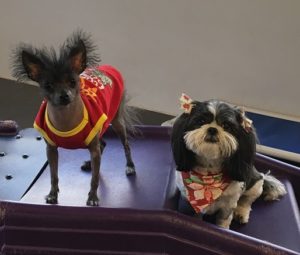Keeping your puppy happy and safe in dog play should be top priority. During the puppy stage, what they learn and experience can affect them for life in either a positive or negative way. Happy Pets Palace is happy to share a few tips on what to look for and how to help your puppy succeed and learn how to self-regulate. This way, your puppy can play nicely with other dogs.
Your voice and tone is important

When giving praise and saying “good boy” or “good girl”, include saying their name first. For example, “Ava, good girl, such a good girl.” Be sure your tone of voice is mild and happy.
When more than one puppy is playing together, limit or avoid using a high pitch voice because high pitch excitement in your voice can escalate puppy play. What you want to do is reward with words and help maintain good play levels. You want to keep their excitement neutralized so puppies can play longer without their play getting out of control. Your tone of voice should be pleasant and calm. When dogs play, their arousal levels increase and can escalate quickly, which is normal. However, high arousal levels and over-excited play styles are closely linked to aggression. Therefore, you want to help your puppy learn how to self-regulate so playtime stays fun and safe for everyone.
Visual cues: the play bow

A play bow is when a dog brings his front legs out in front of him and his chest low to the ground as if he’s about to lie down, but his rear end remains up.
A play bow is the best visual cue or signal your dog can give to another dog to signal that he/she wants to play.
That is a welcome sign to the other dog saying, “I want to play with you! Whatever happens, if it gets too rough, I don’t mean it in a bad way. Let’s have fun!”
If the other dog accepts the play then oftentimes they will reciprocate a play bow back which acknowledges the invitation to engage in play.
Common play styles you will see include running and chasing, body slamming, wrestling, neck biting, and rearing up like stallions (my favorite).
After a play bow, it’s all good as long as the play is balanced play and stays balanced.
Balanced play helps puppies self-regulate
When dogs play, there should be equal exchange and a balance between the two. Balanced play is the main thing you should be looking for when your dog plays with any other dog. Balance is key for everyone to enjoy the moment. The play should be reciprocated, always.
For example, you should see Dog A chase Dog B and then it switches and Dog B chases Dog A. Or if Dog B has Dog A on the ground and is lightly chewing around their neck area within a minute Dog B should let up Dog A so they can switch or give Dog A a break. If Dog B keeps Dog A pinned and doesn’t let up the dog on bottom within 60-90 seconds, then you need to step in and separate them. The dog on top needs to understand that it has been long enough and he/she needs to give it a rest and let the other dog have their turn.
What you probably see instead
What you will probably see instead is a shake off and a couple minutes where they go their own way. Emotions need to be reset because there is an understanding that what just happened in play was unacceptable and rude. Puppies can learn to self-regulate. If they don’t do so automatically, then they need our supervision and they need repetition to help them learn. Puppies have egos too. If they are not corrected of their rude behaviors at an early age they probably won’t be good in group play when they get bigger.
If one puppy seems to dominate the play then you need to help that puppy learn how to self-regulate, take turns, and respect their play friends. Learning self-regulating is best done at an earlier age. Puppies are learning proper dog play etiquette. They learn proper play from being around other dogs. You want to ensure your puppy is nice and doesn’t acquire behaviors that other dogs consider rude.
At Happy Pets, we encourage and allow good play
At Happy Pets Palace we continually monitor the play. We help puppies learn how to self-regulate. And also important, we discourage bad behaviors that are considered rude in the dog world. The best play is continually exchanged, going back and forth equally, between two dogs with occasional play bows to ensure that it all stays good.
Puppies do need repetitive kind corrections so they learn what they should do or should not do. For example, if your puppy plays nicely with another puppy, encourage that style of play by using your calm, positive voice. Reward them with your overall body posture being relaxed and agreeable, happy facial expressions, and your approving mood tone. Puppies LOVE YOU and they do keep tabs on you! They look to you for your approval, rewards, acceptance, and being part of the pack. They want to please you. So help them to be a happy puppy around other dogs by learning proper dog etiquette and how to self-regulate so they can have an enriched life with lots of dog friends for a long time.
